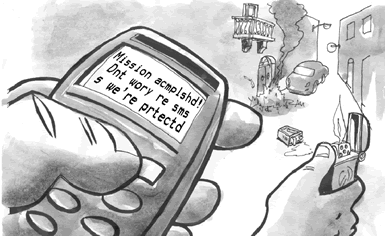Last Wednesday’s court sentence by Judge Philip Sciberras is a serious setback to our country’s security and executive safeguards of the free press.
Presiding over the appeals court, the judge has single-handedly set a dangerous precedent that ties the hands of police investigators following serious crimes of national and public security.
He has effectively closed the door to all evidence falling under the Data Protection Act, basing his decision on one gross fallacy which betrays his misunderstanding of this piece of legislation.
The case regards a request by the Police Commissioner for Vodafone and Go Mobile to provide the so-called “location data” on mobile phone calls and text messages in connection with the vicious arson attacks on the private residences of human rights campaigners and journalists – including this newspaper’s editor – who have been vociferous about the immigrants’ pleas for dignity and a better life.
The information would have shown who was close to the scenes of the arson attacks at the time they happened, according to the signals emitted by their mobile phones. For investigators, such information was vital. Admittedly, the evidence in itself would not have automatically solved the crimes, but it would have gone a long way towards narrowing down the investigators’ range of suspects.
However, the two companies refused to pass the requested data on to the police, citing their clients’ fundamental right to privacy, although written between the lines of their arguments made in court, one could easily see they were really not so keen on analysing the information and presenting it for the investigators’ perusal.
Setting strict guidelines regulating the use of such personal data, the Data Protection Commissioner had given the go-ahead for the companies to present this information to the police. Among the privacy safeguards imposed by the commissioner, the police had to use the data exclusively for the specific arson investigations, and the data had to erased if it was found to be irrelevant to the investigation.
The two mobile companies still refused to cooperate, and appeared in front of the Data Protection Appeals Board, which confirmed the commissioner’s ruling. Yet again, they refused to comply and took the case to court in front of Mr Justice Sciberras, who overruled the data protection commissioner’s sentence irrevocably.
In his judgment, Mr Justice Sciberras allowed the two mobile phone operators to lead him to believe that their resistance is fuelled by human rights considerations and their clients’ privacy. But it is naïve to believe this, especially when both companies have qualified technical experts in “data mining”, or have published vacancies to recruit new ones.
In other words, they are investing money, time and resources to do precisely what they refused to do for police investigators.
Yet the right to privacy is regulated by the Data Protection Act; human rights are much broader principles. The most important legislation in this case ought to be the subsidiary legislation about data processing by the police. The judge evidently thought he had struck a balance between fundamental human rights and security, whereas it should have been an in-depth interpretation of the data protection act.
Mr Justice Sciberras seems to be arguing that the police should not even process CCTV footage of, say, a public square where someone is murdered, as all the people appearing on footage passing from that square would be by default “suspects”.
In today’s digital world, whoever has his or her mobile signal picked up by a bay station is essentially on the scene of the crime, give or take certain technical parameters.
Incidentally, just on the night when the sentence was reported in the press, vandals set a truck on fire in Mriehel and vandalised another one parked next to it.
Used for business intelligence and financial analysis, data mining is all about extracting useful information from databases. What the telephone companies will do with the extracted information is anyone’s guess, but it is clear it will be used for anything but solving serious crimes.
This newspaper has always been a liberal champion of civil liberties and data protection for the defenceless citizen. It is also against the draconian measures taken by administrations abroad that stigmatise whole categories of people under the pretext of the so-called “war on terror”.
But in denying police investigators access to potential evidence that can lead to solve these serious crimes verging on terrorism, Mr Justice Sciberras has denied them a very important piece of the arson puzzle that remains unsolved.
The arsonists must be gloating.
--------------------------------------------
Quote of the week:
“It was all orchestrated … It was all predetermined”
– Edward Debono, lawyer of the Ramla l-Hamra developers, after last Thursday’s MEPA ruling revoking the permit to expand Ulysses Lodge.
--------------------------------------------

